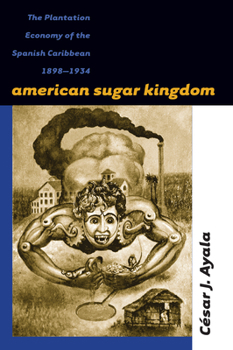< Back to Search Results
American Sugar Kingdom: The Plantation Economy of the Spanish Caribbean, 1898-1934
Select Format
Select Condition 
Book Overview
Engaging conventional arguments that the persistence of plantations is the cause of economic underdevelopment in the Caribbean, this book focuses on the discontinuities in the development of plantation economies in Cuba, Puerto Rico, and the Dominican Republic in the early twentieth century. C sar Ayala analyzes and compares the explosive growth of sugar production in the three nations following the War of 1898 -- when the U.S. acquired Cuba and Puerto Rico -- to show how closely the development of the Spanish Caribbean's modern economic and social class systems is linked to the history of the U.S. sugar industry during its greatest period of expansion and consolidation.
Ayala examines patterns of investment and principal groups of investors, interactions between U.S. capitalists and native planters, contrasts between new and old regions of sugar monoculture, the historical formation of the working class on sugar plantations, and patterns of labor migration. In contrast to most studies of the Spanish Caribbean, which focus on only one country, his account places the history of U.S. colonialism in the region, and the history of plantation agriculture across the region, in comparative perspective.
Ayala examines patterns of investment and principal groups of investors, interactions between U.S. capitalists and native planters, contrasts between new and old regions of sugar monoculture, the historical formation of the working class on sugar plantations, and patterns of labor migration. In contrast to most studies of the Spanish Caribbean, which focus on only one country, his account places the history of U.S. colonialism in the region, and the history of plantation agriculture across the region, in comparative perspective.
Format:Paperback
Language:English
ISBN:0807847887
ISBN13:9780807847886
Release Date:November 1999
Publisher:University of North Carolina Press
Length:336 Pages
Weight:1.22 lbs.
Dimensions:0.8" x 6.2" x 9.3"
Customer Reviews
0 rating





